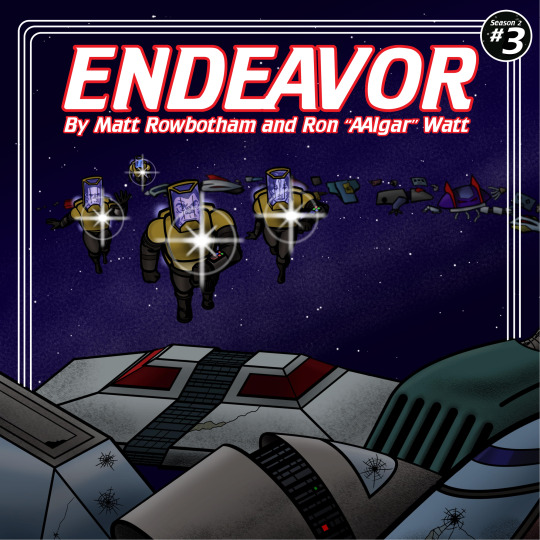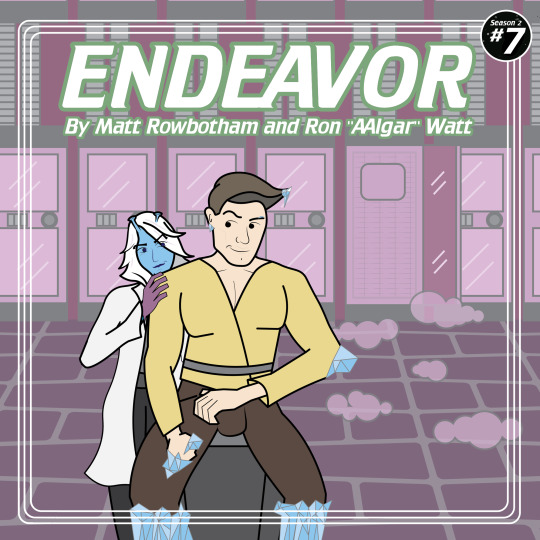#maggie rowbotham
Text
Endeavor!
From 2010 to 2020, the two people responsible for this blog (Maggie Rowbotham and Ron AAlgar Watt) reviewed the entirety of Star Trek on the Post Atomic Horror podcast. Yes, all of it. Even the really awful parts. In fact, we were so successful in our mission that we ran out of things to review. So we switched to a different project to allow the buffer to fill back up again.
We learned a lot in that decade — about what really works in Star Trek; what really doesn't work; and what we wish we could see more of. Which led to the creation of our fanfic series, Endeavor.
Endeavor tackles political issues that mainstream Trek has been a bit... ham-fisted in dealing with. It includes an ongoing and frank discussion about neurodivergence. And it is unapologetically queer. There is so much of both of us infused into the DNA of this show, not to mention a stable of brilliant performers, co-writers and an actual composer. We could not be prouder of it.
Our second season began in early 2020. Ten episodes were originally planned, releasing at a rate of one per month. But then we were hit with a number of unavoidable delays. Who can say why? It's not like anyone else we know lost their entire minds starting in early 2020.
We did end up expanding the season to 12 episodes, and we managed to get 11 of those out by April of 2022.











The season finale, “Birth of a Nation,” took... a bit longer to get sorted out, but I'm pleased to announce that it's finally here.

Clocking in at over an hour in length, “Birth of a Nation” pays off a lot of stuff: the ongoing arcs of our three principles; the storyline involving the obviously-a-stand-in-for-white-supremacy world of Macaria; the financial misadventures of the Ferengi Tod; and threads of varying shapes and sizes, too numerous to list here, stretching back to our premiere episode.
This is not a series finale. Endeavor will be returning with a third season. But if we did have to end the show here, for whatever reason, we think this would serve as a pretty solid final chapter.
As with all non-corporate-backed Internet efforts, making people aware of our show and getting them to actually listen to it is a constant challenge. So, please: if you like Star Trek (or even just science fiction with a genuinely optimistic outlook for the future) and/or fully-scripted, fully produced audio drama, give our show a listen. And tell your friends.
A pledge to our Patreon (which helps us pay the performers) would not go unappreciated, either.
#Star Trek#fanfic#Endeavor#Naomi Wildman#tellarite#cardassian#post atomic horror#ron aalgar watt#maggie rowbotham
13 notes
·
View notes
Text
On the left, there were always those who questioned whether Mrs Thatcher deserved her status as the nation’s first woman Prime Minister. ‘She may be a woman but she isn’t a sister, she may be a sister but she isn’t a comrade,’ explained the playwright Caryl Churchill, adding that there was ‘no such thing as right-wing feminism’. So in Churchill’s play Top Girls (1982), Mrs Thatcher is represented by the ruthless Marlene, who has sacrificed her femininity and abandoned her child to compete with men and get to the top. Marlene is naturally a great fan of the Iron Lady. ‘She’s a tough lady, Maggie. I’d give her a job,’ she says admiringly. ‘First woman prime minister. Terrifico … I believe in the individual … I don’t believe in class. Anyone can do anything if they’ve got what it takes.’ Top Girls has a tremendous reputation in some circles (academics, basically), but it has to be said that its analysis of Thatcherism falls well short of the height of sophistication. ‘I hate the working class,’ says Marlene, who thinks the term just means ‘lazy and stupid’. ....
Among radical feminists, Top Girls’s basic argument – that women like Mrs Thatcher only got on by surrendering their femininity and betraying their sisters – was very popular. There was an ‘air of unreality’ about her, thought Sheila Rowbotham. ‘Not only the voice is contrived; her whole body can be seen in permanent tension, shifting across the borders of femininity and masculinity.’ Mrs Thatcher had completely failed to develop a ‘critique of the patriarchal family’, agreed Beatrix Campbell. ‘Femininity is what she wears, masculinity is what she admires. She wants to be a woman who does what men do.’ And in some quarters this view proved remarkably enduring. ‘The first Prime Minister of female gender, OK. But a woman? Not on my terms,’ thundered the Oscar-winning Labour MP Glenda Jackson after Mrs Thatcher’s death. ‘She set back the cause of women in public life,’ agreed the novelist Hilary Mantel. ‘She imitated masculine qualities to the extent that she had to get herself a good war … The idea that women must imitate men to succeed is anti-feminist. She was not of woman born. She was a psychological transvestite.’
starting to think that maybe Margaret Thatcher is the reason why the British left is so terfy
383 notes
·
View notes
Text
Bức thư tuyệt mệnh của bé gái 13 tuổi bị lạm dụng tình dục
Chủ nhân bức thư từng là một trong nhiều nạn nhân bị băng đảng gốc Á cưỡng bức vào năm 2003.
Victoria Agoglia, 13 tuổi, là nạn nhân của một vụ lạm dụng tình dục ở Anh vào năm 2003. Bức thư từng được trình báo nhưng đã bị cảnh sát làm ngơ.
Phần ghi chép của Victoria được mở đầu bằng tiêu đề: “Những điều tôi đã làm trong quá khứ”. Cô bé miêu tả sự đau khổ, dày vò của bản thân: “Tôi mới 13 tuổi, tôi đã ngủ với những người đàn ông lớn tuổi hơn mình. Một nửa trong số họ tôi còn không biết tên, tôi là một con điếm và chẳng có gì để tự hào…”. Trong bức thư, cô bé 13 tuổi cũng thú nhận về việc mình đã sử dụng các chất kích thích và cảm thấy có lỗi với gia đình, người thân.
Victoria sau đó tìm đến sự trợ giúp của cơ sở y tế tại địa phương. Sara Rowbotham, nhân viên chăm sóc sức khỏe giới tính, nhớ lại Victoria là cô bé ưa nhìn, hài hước và có sự cuốn hút. Cô bé từng liên lạc với cơ quan chức năng 181 lần để báo cáo việc mình bị lạm dụng tình dục nhưng không hề được can thiệp. Cô bé đã tuyệt vọng đến mức tự vấn bản thân rằng “Phải có ai đó chết thì sự việc mới được giải quyết sao?”.
Vài tháng sau khi viết bức thư kêu cứu, Victoria được phát hiện tử vong do sử dụng ma túy quá liều sau khi bỏ trốn từ một nhà chăm sóc ở Rochdale.
Năm 2005, lá thư xuất hiện trong báo cáo của cảnh sát Greater Manchester nhằm kêu gọi điều tra một băng đảng chuyên lạm dục tình dục ở trẻ em gái với 97 kẻ tình nghi nhưng cuối cùng đã không được giải quyết.
Maggie Oliver, cựu điều tra viên, cho biết: “Tôi là người đã viết bản báo cáo đó. Tôi bắt đầu nó với bức ảnh của Victoria và bức thư của con bé. Bất cứ ai nhận tờ báo cáo đó đều sẽ thấy hình ảnh xinh đẹp của Victoria. Cô bé 13 tuổi và đã thẳng thắn nói về việc bị rất nhiều người đàn ông xâm hại đến mức không đếm được số lượng. Cô bé yêu gia đình và cảm thấy những hành động của mình khiến họ thất vọng. Victoria chết do dùng thuốc quá liều nhưng tôi biết con bé đã bị xâm hại. Tôi muốn cơ quan chức năng làm rõ vấn đề này bởi nó có thể dẫn đến hệ lụy tiêu cực cho những đứa trẻ khác".
Mãi đến năm 2010, khi 9 người đàn ông bị bắt giam do nghi có hành động cưỡng hiếp, lạm dụng tình dục trẻ em và chiến dịch Operation Span được mở ra nhằm điều tra vụ việc thì vấn đề này mới được chú trọng.
9 kẻ phạm tội đã bị bắt giữ vào năm 2012.
Năm 2012, nhóm đàn ông đã xâm hại trẻ em gái dưới 13 tuổi bị tuyên án tù từ 4 đến 19 năm. Kẻ cầm đầu là Shabir Ahmed, 64 tuổi, còn được gọi là "bố già", lĩnh án 19 năm tù vì tội danh cưỡng hiếp, tấn công tình dục trẻ em, buôn người...
Cũng trong năm 2012, trước khi những kẻ phạm tội ấu dâm lĩnh án, điều tra viên Oliver đã xin từ chức và rút khỏi ngành cảnh sát. “Tôi từng phụ trách việc điều tra này, từng xem ảnh của Victoria, từng đọc bức thư và báo cáo vụ việc nhưng cũng là người đã phải ngừng việc điều tra đó lại. Những thất bại trong công việc lúc bấy giờ đã cho phép tội phạm trốn thoát và không phải chịu trách nhiệm cho tội ác chúng gây ra. Cảnh sát có trách nhiệm bảo vệ mọi người nhưng đã cố ý làm ngơ trong suốt nhiều năm. Điều đó sẽ không được phép lặp lại thêm một lần nào nữa”.
Thảo Nhi
Nguồn: http://ift.tt/2tFYwSs
0 notes
Text
Three Girls viewers in fury that Sara Rowbotham was fired
Viewers of the BBC’s chilling Rochdale abuse drama Three Girls erupted with anger when they learned that the hero sexual health worker lost her job after the case.
Fans were left ‘disgusted’ when Thursday night’s finale revealed that Sara Rowbotham was ‘excluded from future initiatives on child grooming’ and later fired.
Furious Twitter users said Ms Rowbotham, played by Maxine Peake, should have been knighted for her efforts in exposing the horrific sex abuse – not ‘forced out of her career’.
Viewers of the BBC’s chilling Rochdale abuse drama Three Girls erupted with anger when they learned that hero sexual health worker Sara Rowbotham (right) lost her job after the case. Pictured left, actress Maxine Peake who took on the role
At the end of the series, producers explained that Ms Rowbotham was made redundant – despite the evidence she collected still being used to prosecute child sex offenders for crimes dating back to 2003.
‘Made redundant?! She should’ve been bloody knighted,’ one user wrote.
‘Sara Rowbotham made redundant because she ’embarrassed’ the system by exposing their gross negligence. Disgusted, not surprised,’ another added.
A third vented: ‘No police officers were prosecuted for their failings but Sara Rowbotham was their saviour and lost her job? Disgrace.’
Yet another viewer asked: ‘When is #SaraRowbotham going to be made a Dame for services to children eh? Praise not damage for heroes like her please?!’
‘Sara Rowbotham MBE please,’ a fifth fan agreed.
Others penned: ‘Sara Rowbotham was the only person who actually did something gets excluded and then made redundant?!? Really? Disgusting!’
Another added: ‘Can’t help but feel Sara Rowbotham was royally screwed over the 2008 Rochdale case. She’s a hero in my eyes.’
At the end of the series, producers explained that Ms Rowbotham was made redundant – despite the evidence she collected still being used to prosecute child sex offenders for crimes dating back to 2003
Many viewers credited DC Maggie Oliver as well, portrayed by actress Lesley Sharp.
‘Sara Rowbotham and Maggie Oliver are heroes of our time. Standing up for what is right is so much harder than standing by,’ one wrote.
‘Horrifying that those most dedicated to the girls, Maggie and Sara, were vilified and forced out of their careers,’ another added.
‘Surprise surprise – the two women who helped these girls – one resigned, one made redundant – the system stinks!’ a third wrote furiously.
It comes after Wednesday night’s episode saw a gripping scene between Sara Rowbotham and DC Maggie Oliver.
At the heart of the stand-off between the two women lies the real story of the years they spent battling for the horrific abuse taking place in Rochdale, Manchester, to be taken seriously.
The precious Peake’s character – complaining that girls had been ‘raped, beaten, not believed, raped, beaten, not believed’ – cut police down to size when they finally agreed to re-examine the allegations.
It mirrors the genuine frustration felt by Sara Rowbotham, who had been referring cases to police in Manchester since 2004, without getting anywhere.
DC Maggie Oliver had worked on cases before Operation Span, where she had convinced young women to trust her only to be told no charges were going to be brought.
According to the Telegraph, the real Ms Rowbotham, now a councillor, made more than 100 referrals to police after starting to see a pattern in her line of sexual health work.
These began in 2004, but it wasn’t until 2012 that convictions were made against nine of the men involved in the abuse.
She suffered personally with poor health after the true nature of the sex ring was exposed and ended up being made redundant from her job in 2014.
Peake met with Rowbotham on several occasions before taking on her role.
In a piece for the Guardian, she wrote about seeing the girls arrive at the clinic having walked miles from remote countryside where they had been taken to be abused.
Sara wrote: ‘My calls to police were ignored and social workers told me the girls were making lifestyle choices.
‘We’d make them a cup of tea, take them to a sexual health clinic to test for and treat sexually transmitted infections and call the police. But, again, the police didn’t want to know.
‘How it took the police so long to act to protect children from evil criminals, why social services showed wilful blindness in ignoring what was happening and how so many agencies had collectively failed to act much earlier.’
DC Maggie Oliver had worked on cases before Operation Span, where she had convinced young women to trust her only to be told no charges were going to be brought
As an officer, Maggie Oliver used her real-life experience to gain the trust of the vulnerable girls she tried to help during police investigations in 2004, and again a number of years later, before Operation Span.
But she said her work was wasted when the operations were non-existent after she came back from caring for and then mourning her late husband.
She said: ‘I worked on an almost identical operation in 2004, Operation Augusta, which had identified dozens of young victims and dozens of suspects.
‘It was a virtual carbon copy of Rochdale, men of largely Pakistani heritage were abusing vulnerable white girls, in Hulme, and around the Curry Mile, in Rusholme. I was on that job for a year and a half. It was a huge investigation.
‘We also had social workers telling us they’d been trying to get the police to take this problem seriously for years.
‘But not one offender was arrested or charged. I couldn’t believe it. It was as if none of it had ever happened.
‘Nobody was ever able to explain to me why the case had been dropped. I wanted to know because I’ve got four kids of my own.’
Source: Three Girls viewers in fury that Sara Rowbotham was fired | Daily Mail Online
from Three Girls viewers in fury that Sara Rowbotham was fired
0 notes
Text
Supplemental 49

Remember your old friends from that old franchise you loved? They're back, and we're here to talk about them once again!
It's the Post Atomic Horror - the most comprehensive Star Trek podcast ever produced - and our first new episode in four years is available now!
Also back: @allvishal and his consistently delightful magazine-themed covers!
6 notes
·
View notes